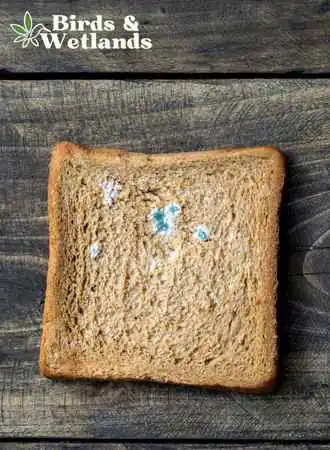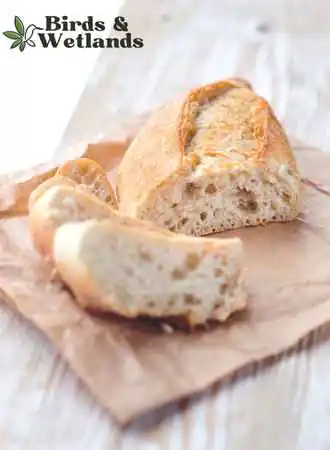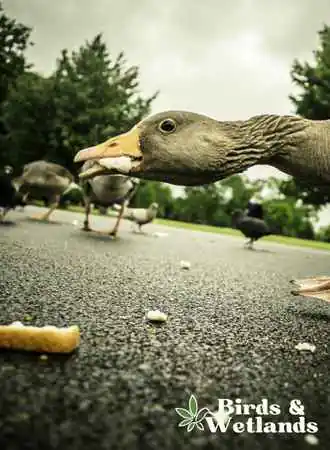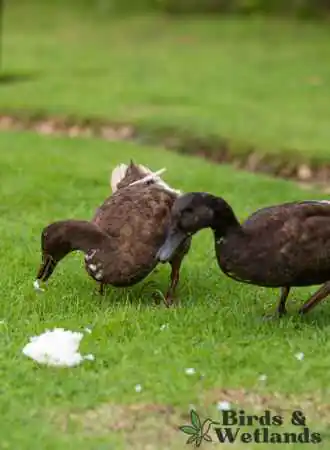As a duck owner, you may enjoy feeding your feathered friends treats like bread, but what happens when the bread is moldy?
Can ducks eat moldy bread?
No, ducks should not be fed moldy bread. Moldy bread can contain harmful toxins and bacteria that can cause illness or even death in ducks. Additionally, feeding ducks bread is discouraged, as it lacks essential nutrients and can lead to malnutrition and other health issues.
Key Takeaways on Can Ducks Eat Moldy Bread
Never feed wild ducks moldy bread because stale bread is unsafe and can make them sick.
Feeding ducks bread regularly is not even recommended. Too much bread can cause different problems for ducks.
There are many healthier alternatives to bread or moldy bread for that matter, that ducks will enjoy.
Why Moldy Bread Is Bad for Ducks?

Mold is a fungus found in a variety of environments, including on food. Mold thrives in warm, moist environments, making it especially prevalent in foods like fruit that tend to perish quickly. Molds pose health risks to ducks and other waterfowl species and are unsightly and potentially harmful to humans if ingested.
Molds produce mycotoxins, toxic chemicals that can have detrimental effects on your ducks’ health. These mycotoxins are extremely harmful to ducklings and adult ducks, causing diarrhea, decreased egg production, and in some cases, enlarged livers.
Maintaining a clean and dry environment for your flock is the best way to prevent mold-induced mycotoxin poisoning. Ensure that you routinely remove mold and mildew traces with a bleach solution or fungicide spray. In addition, don’t feed ducks moldy bread or anything moldy.
If your ducks accidentally eat moldy bread, your flock is probably okay. But never feed your feathered friends moldy food, even if ducks eat them.
How to Prevent Moldy Bread
Ducks like geese can eat bread but only in moderation. So if your ducks eat bread, know that bread is frequently susceptible to mold growth, resulting in undesirable flavor and texture changes. Fortunately, there are several straightforward ways to mitigate this risk.
Store in a Cool, Dry Place

Storing bread in cool, dark storage is one of the most effective ways to prevent mold growth. Doing so reduces exposure to moisture, which reduces the likelihood of mold spores establishing themselves on the bread’s surface.
Additionally, a cool environment inhibits rapid surface growth, allowing more time for any spores on the bread’s surface to be removed before they can form visible colonies or further penetrate the interior.
Seal the Bread Container Properly
Sealing the container in which bread is stored can reduce the likelihood of mold growth. Sealing eliminates all spaces where moisture can accumulate and mold spores can thrive.
Additionally, it prevents excess air from entering the container, which can encourage mold growth. A tight seal prevents the bread from contacting external contaminants, such as bacteria in food packaging or airborne dust.
Put Your Bread in the Freezer
Ideal bread storage conditions include cool and dry conditions. The bread will retain its freshness longer and be less likely to develop mold if stored in such situations.
However, even with proper storage methods, it can be difficult to prevent mold growth, particularly in warm and humid environments.
Fortunately, another essential method for keeping bread fresh is freezing it. This may initially appear counterintuitive since most people associate the freezer with ice cream and leftovers.
However, freezing prevents mold growth by removing its primary source of moisture. Water vapor within the bread’s fibers has been released into the air as moisture atoms due to temperature fluctuations in the refrigerator.
You can prevent mold growth without affecting its flavor or texture if you properly wrap your bread before placing it in the freezer.
Why Is Bread Bad for Ducks?

Ducks eat bread, but it is not a good idea to feed bread to ducks at your local park. Many individuals are unaware that feeding bread to ducks is detrimental to their health.
Bread has little nutritional value but is loaded with carbohydrates. It may also contain other ingredients such as salt and preservatives.
Feeding the ducks too much of it can cause painful digestive issues. Feeding bread to ducks has been associated with the development of angel wings, an abnormal growth on their wings that hinders their ability to fly.
Additionally, regularly feeding bread in local parks can encourage larger flocks of birds to congregate around feeding and watering areas. Over time, this can wreak havoc on vital ecosystems and cause problems for animals that rely on these locations.
Due to these factors, feeding your duck nutritious foods such as seeds or insects is always preferable instead of potentially harmful items such as bread.
Keeping our parks clean and responsibly feeding the ducks can protect these beautiful creatures from injury or disease. Remember that even a small amount of uneaten food can attract rats.
What Other Foods Do Ducks Eat That Are Better Than Bread?
Ducks can eat crackers and bread, but not as often as many people think. In fact, it is better not to feed ducks bread altogether and feed your feathered friends healthier foods instead.
Cracked corn is a popular option because it is rich in nutrients and a great energy source for ducks. Wheat is another excellent treat, as it is abundant in healthy fats, vitamins, and minerals.
Additionally, oats and barley are nutrient-dense grains ideal for ducks because they help strengthen their immune systems.
In addition, grapes are excellent treats for ducks because they are rich in antioxidants and have a sweet flavor that most birds enjoy.
With so many nutrient-rich options available, feeding ducks has never been simpler.
Similar Foods for Ducks

| read | Can Ducks Eat Regular Bread? |
| Rice | Is Rice a Safe Snack for Ducks? |
| Popcorn | Can Ducks Munch on Popcorn? |
| Crackers | Are Crackers a Suitable Treat for Ducks? |
| Chips | Can Ducks Snack on Chips? |
Best Duck Feed Pellets
Are you a duck owner looking for the perfect feed to keep your feathered friends happy and healthy? Look no further than Purina Duck Feed Pellets! With their nutritionally balanced formula and high-quality ingredients, these pellets are the ultimate solution for providing your ducks with the nutrition they need to thrive.
Pros
- Complete Nutrition: Purina Duck Feed Pellets are nutritionally balanced to provide all the essential vitamins and minerals that ducks need to stay healthy and strong.
- Easy to Digest: The pellets are specially formulated to be easy to digest, which makes them ideal for ducks of all ages.
- Promotes Growth and Development: With its balanced nutrition formula, Purina Duck Feed Pellets are designed to support healthy growth and development in ducks.
- Suitable for All Breeds: Whether you have domestic ducks or wild ducks, Purina Duck Feed Pellets are suitable for all breeds of ducks.
- Trusted Quality: Purina has been producing high-quality animal feed for over 100 years, so you can trust that your ducks are getting the best possible nutrition with Purina Duck Feed Pellets.
Cons
- Cost: Compared to other types of duck feed on the market, Purina Duck Feed Pellets can be slightly more expensive. However, many customers feel that the high-quality ingredients and balanced nutrition formula are worth the extra investment.
- Pellet Size: Some customers have noted that the pellet size of Purina Duck Feed Pellets can be quite large, which may not be suitable for smaller or younger ducks. However, many customers have reported that the pellets can easily be broken up or soaked in water to make them easier to eat.



